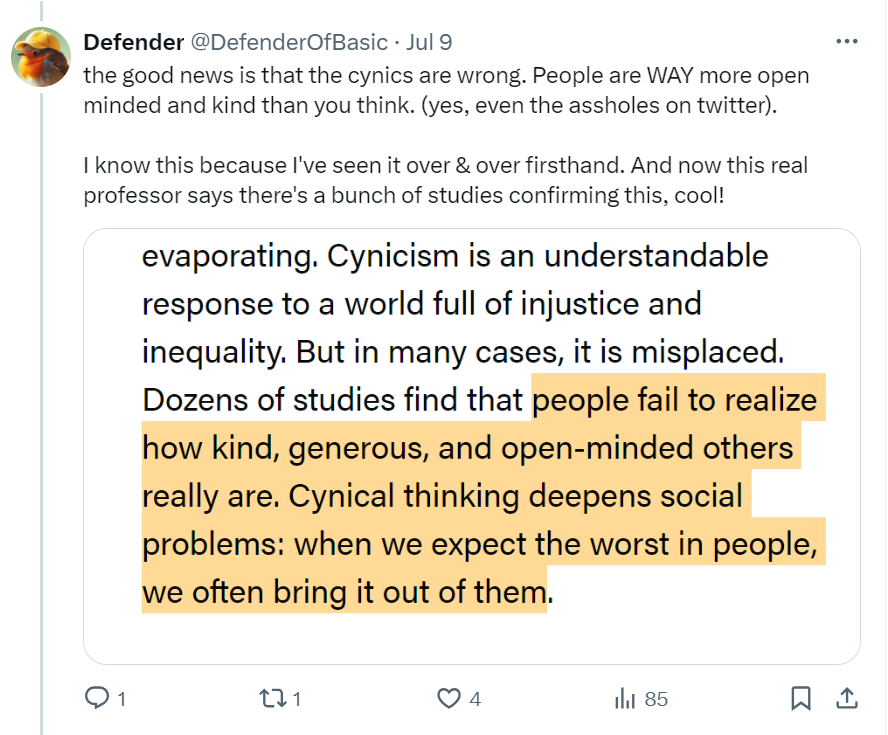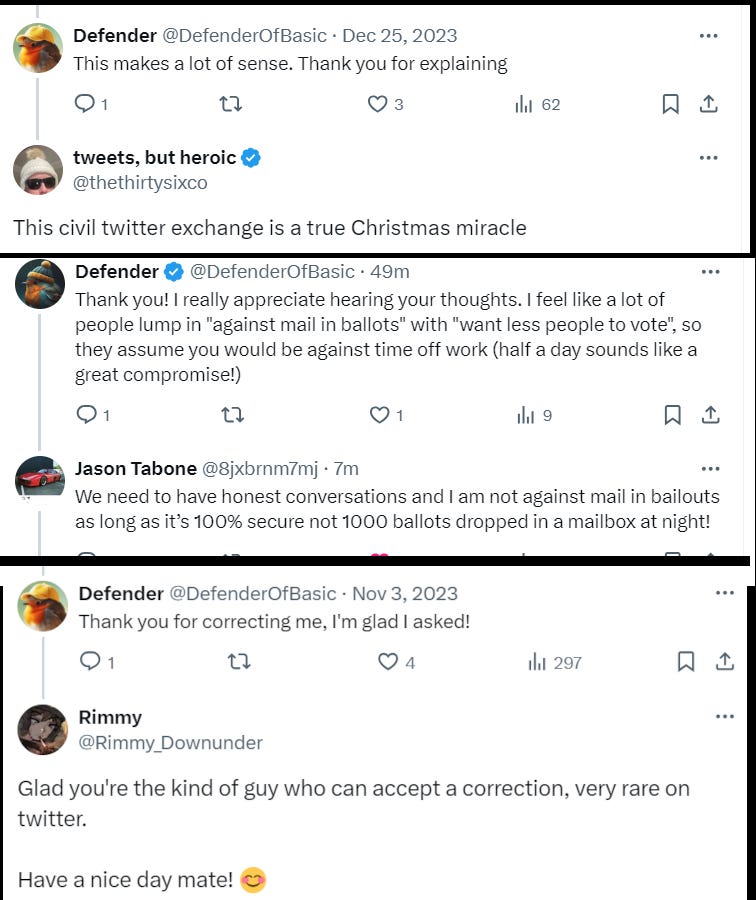I started writing a book
It's like a fictional autobiography, but it's set in the real world?
I tweeted this a few days ago:
someone wrote an incredible fiction/nonfiction book about what happens in the year 2025 and it was such a beautiful inspiring vision with step by step instructions that people just started making it happen and small things in the book came true and it made it go viral
It was brilliant because the book itself was released half finished. It was public domain. It was for sale but it was public domain. Anyone could finish their version of it and sell it. Communities coalesced around it, it was one big game
The whole thing was written from this past tense. It wasn't a hopeful vision for the future. It was a description of what has already come to pass. People updated it to keep it true. It was a collective vision owned by no one, and it really did come true
Do you see what I’m trying to do?
The tweets above aren’t talking about the book I want to write. The tweets above *are* the book I am writing. “someone wrote an incredible book that did so and so” is a statement about my fictional world. But also: it’s my todo list. It’s what I plan to do.
I’m publishing my todo list + a narrative of what I think will happen when I do it.
Cute, right? It was fun to watch people get it in real time, like Hunter:
Oh, so you just keep writing about the book, interesting
Yes, the thing about the book that really did it for me was how it explained what it was doing while it was doing it.
One of the things I was fantasizing about in this fictional world of the book is that, no one person actually writes it. It’s way too big of a project. What happens instead is that, just by *trying* to write the book, individuals start thinking about their own visions for a better future, we find each other, and then we help each other.
So I was *really* excited when Bevan replied:
Nice! At first I was like... What is this book! How have I never heard of it??
But then I remembered! I particularly liked the bit where people start to realize that even their perceived enemy's have the same tender hearts and fundemtal drives that they themselves have! <3
This made me so happy because, this WAS something I wanted to put in the book. And I loved how Bevan phrased it. And look at that, now it’s in the book!
(this substack post is itself part of the book project, this post is how my book starts, it’s the introduction? or prelude? I don’t know I’m still trying to figure that out)
I’ve thought a lot about this because I keep seeing a ton of cases where people who vehemently disagree online don’t realize that they share the same desires/vision for a better world (they disagree on *how* to get there but not what they want). This isn’t true of all disagreements, but it is true for some %. This is the low hanging fruit of societal divisons.
I know this is true because I’ve seen it, I’ve pointed it out to people, and they went, “oh shit, you’re right”. Angry, toxic twitter interactions transformed to pleasant, productive ones. (todo: collect these examples and write about them in the book, people don’t believe me when I tell them this. It blows people’s mind when they see this. Every single time it has happened people are like, “omg, a civil interaction on twitter? it’s a miracle!”)
It’s not a miracle, it happens all the time!
Half history, half prediction
So this is how the book starts. My book isn’t about some happy future that hasn’t happened yet. The book is about things that have actually happened that have improved my life, like all the connections I made on twitter, even with people who came in insulting me and calling me evil/an idiot, and how we learned a lot from each other.
It’s about how after doing this for months, I found out there’s a Stanford professor (Jamil Zaki) writing a book on this, he’s studied this, about how the cynics are objectively wrong. That people actually DO listen, and change their minds, all the time.

The book is about how I collected all these twitter interactions, and the techniques I use to do it, and it was a great complementary read to Jamil Zaki’s book. His was hard science, real academic. Mine was putting it into practice, and showing how everyday people can do this, and do it well.
(that last paragraph is a prediction, Zaki’s book hasn’t come out yet, neither has mine)
I think this will be the most fun part of this book. A lot of it will be things that actually happened. At some point it switches to predictions, without a clear line. The game for the reader is to guess what is fact and what is fiction. I won’t mark this point of transition because it’s dynamic: some of the fiction becomes facts from the time I wrote it to the time I published it.
Even better: this book is public domain. If you as a reader don’t think a prediction is good (like, you *don’t* want it to happen, OR you do want it to happen but you think my plan won’t work, you can just change that, and republish it! or tell me and I can update it).
Balancing accuracy & beauty
The version of the book that succeeds is the one that predicts things that actually happen. That is an impressive thing that I don’t think I can do that well, but I bet there are others who can. You can’t fake this part. If you make good predictions that actually happen, you get clout, you get attention.
The most accurate book won’t be the one that wins though. There will be versions of the book that connect with people, where the vision gets people excited. And people getting excited itself contributes to the thing happening, even if it was LESS likely to happen at the beginning!
Do you see how this game works? We write down what we want to happen, and how we’re making it happen, and we find others who also want the thing to happen. And the best vision wins. Whoever is best at marketing wins. Whoever is competent and has good ideas win.
I rescind all rights to this book. I have no claim on it. I will try my best to write this, and I think I can contribute some really good parts, but ultimately we will be able to create something far better in collaborative competition than any person or group or institution can.
This book is unfalsifiable
Phew, this is crazy ambitious right? Who am *I* to create a plan for society? Who do I think I am???
No no. I’m really not making a plan for society. I’m writing an autobiography about my life, about things that happened, and about what I want to do next. And I hope to connect with others doing the same. This is the one prediction I am most confident in.
And, well, it’s already happened. I just learned
started writing his version of exactly this project back in April:We found each other because of my tweet, just as the book foretold.
I’m going to commit to publishing weekly-ish updates on this, so please subscribe! (I really need your help & feedback!!!) There will be a github repo incoming with my drafts/plans and the weekly essay will summarize the progress. It’s like a devblog for a video game, except it’s an open source book.




My favorite part of the book was the nearly-anonymous little side characters who hear about it in the beginning, and just commented about how it sounded like a neat idea and wished the author luck. But then those side characters appear in a totally different context later, after they have their own lasting reputation, and it's only through close reading of comments and footnotes that you even realize the two characters were really the same person.
The book was an incredibly successful project, in no small part due to its timely metamodernist approach. Readers especially enjoyed being incorporated into the creative process, which allowed them to participate as much or as little as they’d like, and in whichever form felt most fun.